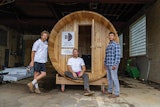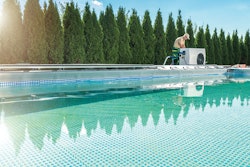
Glen H. Egstrom, Ph.D., is a professor emeritus at the UCLA Department of Physiological Sciences. Since 1954 he's dedicated himself to the water industry, serving as the director of the school's underwater kinesiology laboratory. There, he has conducted human performance studies as well as stroke mechanics, headfirst diving and the impact of aquatic equipment on performance and safety.
Dr. Egstrom may be officially retired, but he's not ready to join the rocking chair set just yet. He still keeps in shape by swimming almost daily and also keeps an office at the university. That's where AQUA caught up with him to get his opinions about pool safety.
He'd be the first to admit that his notions about safety aren't always popular, but they are certainly well reasoned and thought provoking, calling into question how much people in the industry really understand about the layers of protection, whether any combinations of measures can be expected to eliminate aquatic accidents and who is responsible for keeping people safe.
"I think you need to start off with the recognition that no matter what you do there's going to be no guarantee that this is going to solve any specific problem that arises with a given child in a given pool," he says. "And since there is no guarantee, that the best we can do is to provide layers of protection.
"But no matter what is done, it can almost always be circumvented by a determined child, and as a consequence – since there's no research to my knowledge that involves layers of protection – we're relying on logic rather than data."
Egstrom says while he has no problem with using logic in this case, the scientist in him knows there can be unforeseen consequences. He cites fences, which are put up to keep unwanted visitors out of a pool. The danger, as he sees it, is in failing to consider the whole picture.
"Any time you build a fence, you'd better understand what you're fencing in and what you're fencing out," he explains. "And with these layers of protection, sometimes we're even putting up things that could be considered a temptation. And once they're inside, they're at risk."
That's not to say fences aren't an important piece of the danger-prevention puzzle, he cautions. It's just that alone they're insufficient. Another safety device, the pool cover, falls under the same category, according to Egstrom.
"Pool covers are very good for keeping debris out and heat in," he explains. "And they've gotten to the point where they have to support a good amount of weight. Still, if anybody gets curious and starts playing with some of the less-expensive covers, they're going to find a way to wiggle in and get under that thing.
"Again, it appears to me that what we're looking at is a bottom-line issue. The bottom line, in my view, is that supervision is the key. You can have all the barriers and signage and all these sorts of things, but if you don't have adequate supervision — and continual supervision for youngsters — I think you're sticking your head in the sand."
Duty Calls
People in the pool and spa industry have often been accused of sticking their heads in the sand about safety, though most will agree great strides have been made in recent years. Still, there's often a reluctance to bring up safety in a sales presentation. Egstrom even argues that touting safety and the benefits of the various layers of protection — fencing, alarms, covers, etc. — can come back to haunt the well-intentioned dealer in certain limited circumstances.
"There is this issue called duty, and in order for a homeowner to have a legitimate lawsuit, they first have to demonstrate that duty exists," he explains. "So one of the things that sometimes is perceived is that the more of this stuff you do, the more duty you're putting onto yourself." With the fear of lawsuits, many manufacturers of safety products are understandably skittish. Pool builders face similar fears.
"They're trying to build a product, and in my experience they do a good job of it, and they are trying to provide as much information as they can without trying to solve problems that they can't solve," he says.
William H. Ginsburg is a partner in the law firm Cotkin, Collins & Ginsburg in Los Angeles. His experience includes liability defense for manufacturers in the spa and pool industry. When asked what a dealer can do to shield him or herself from liability, he admits there's a temptation to avoid it, but offers guidelines for those who know the importance of selling safety.
"If a dealer touts the virtues and features of an external or additional device and then records that he has advised the individual of the device that is not mandatory by code, that would be terrific and I don't think they would ever have any problems," he says. "But we're dealing with sales folks here. Nothing against them but they're not lawyers and they don't always record things as they should. So if the salesperson touts a product but doesn't record it and record the customer's refusal, then I think Glen's got a point.
"For example, if you're selling me a pool and you know that I've got children in the house that are old enough to climb up and jump into an aboveground pool or fall into an in-ground pool, then why wouldn't you insist that I buy a fence until my children are swim-safe. It may be that you suggested a fence to go around the pool for a couple of years. Needless to say, how could you prove that you suggested it and the client said 'no' if you didn't record it?"
Ginsburg says that if he had his way, he'd have the salespeople trained to tell customers about the safety products that are available and to have them sign off on the ones they choose and refuse.
"You want the contract to state that 'The risks and problems associated with a swimming pool have been discussed conceptually and in part with the contracting party. The contracting party understands that these devices are available, among others, and has elected to purchase the ones listed below and rejected the ones listed below.' Then maybe you'd say, 'Other safety devices may exist, and the customer was referred to the Internet for that purpose.'"
Ginsburg adds that dealers and builders who understand they have a responsibility to discuss safety with their clients actually have an advantage over those who shy away from the topic for fear of scaring buyers away. And eventually, he thinks, others in the industry will follow suit.
"The market will take care of that," he says. "When the guys that are doing the safety sell are stripping the other guys of their sales — because they're advertising that they sell safety and are giving everyone a warm, fuzzy feeling — then the others will start doing the same thing, won't they."
Education
Aside from offering and explaining the benefits of layers of protection, then getting the customer to sign off on a contract such as Ginsburg recommends, what else can a conscientious dealer do to protect his or her customers?
Beginning with the realization that it's impossible to eliminate all accidents, the best way to minimize them, Egstrom says, is through education. Industry trade groups and nonprofit safety organizations often spearhead such campaigns.
"In places where they make really strong efforts — and there are a number of programs such as Gus & Goldie (safety mascots) and 'First Time Feet First' (a safe-diving slogan) — they have made a difference," he says. "But of course you don't have efforts like that everywhere. And even in areas where they've put these into effect, there's still no objective way of knowing how much good they've done. I do know they still have accidents."
Egstrom adds that while "tons of organizations" are stepping up to the plate in an effort to educate the public about the potential dangers of swimming pools and how layers of protection can minimize them, there's one party that's not taking its share of the responsibility.
"The various governmental agencies, if they take on the job of providing regulation, it's my view that they should also be taking on the job of enforcement and education," he says. "And that's where the ball gets dropped a lot.
"So if we came back to what I consider to be the solution, we would spend more money on education, and if we did that we probably wouldn't even need the restrictive legislation, nor would we see this essentially fertile ground for lawsuits."
Progress Report
Despite the best efforts of industry groups, including the National Swimming Pool Foundation, which issued the "Aquatic Safety Compendium," containing chapters by Egstrom, Ginsburg and others, it's important to remember that aquatic accidents can't be completely eliminated.
"There's a great deal of emotion that's associated with all of these types of accidents," Egstrom says. "I can't think of anything that would be much worse than losing a child or loved one in any kind of accident. So what can we do. Again, I'm a great believer in education, and I believe that educated people are going to take calculated risks. That's part of what we do. I've dived into shallow ends of swimming pools all of my life, and I know probably better than most what the pitfalls are, but I also know that if I use my skills properly, I'm not going to have a problem. And if I do have a problem, it probably can't be helped."
As for the safety of the public in general — and children in specific — Egstrom expresses guarded optimism and stresses the need for further research and education.
"I think we're doing a very good job and I think that the education programs that are out there are making an impact," he says. "Can I prove that. It would be very difficult because the studies have really not been done in the way in which they need to be done.
"But if you look at the kind of risk levels that are associated with something like being struck by lightning, we're certainly far better off than that. And when you take a look at other kinds of active things and compare the number of aquatic incidents over the number of exposures and do a comparison, aquatic activity is, in my view, very safe."
Dealers, then, are advised to sell safety, keep track of what the customer opts to buy and to pass up, and above all to stress the importance of layers of protection — especially parental supervision.
"I think that the parents also need to be the educators for their children and for the people that they have in as guests. They need to take an active role in maintaining an understanding about what it takes to keep people out of trouble," Egstrom says. "But even that's not going to solve the entire problem."











































